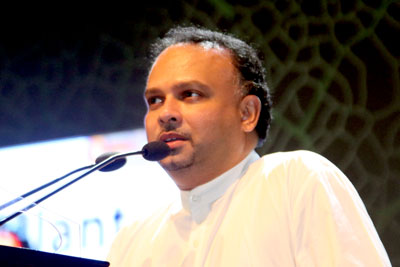Tea, rubber in crisis? So is the Plantation Minister
It’s not only tea, rubber and coconut producers in Sri Lanka having a hard time with lower prices, rising costs of production and fertilizer issues.

Minister Navin Dissanayake, and a section of the audience. Pix by Priyantha Wickramarachchi
The Plantation Industries Minister says he has the same problem.
“The most difficult responsibility for me as the Plantation Minister is balancing the (interests of) stakeholders in tea, rubber and coconut sectors. Solving their problems, listening to all their ideas and bringing them all together is the challenging task I have.”
Minister Navin Dissanayake spoke about his own problems in a troubled industry that has gained a lot of attention, while addressing planters, stakeholders and foreign delegates at the inauguration of Coconut, Rubber and Tea (CRT) Trade Fair held at the BMICH in Colombo last week. The CRT Trade Fair was the first international exhibition organized by the Ministry of Plantation Industries in Sri Lanka and was inaugurated by President Maithripala Sirisena. It was held from August 11 to 13. Mr. Dissanayake also stated that there is a lot of demand for Sri Lankan tea, rubber and coconut in China. “If the country can export tea, rubber and coconut to China alone, we can earn a lot of revenue. In another three to four months Sri Lanka will be signing the Free Trade Agreement with China that will open up the Chinese market and allow us to export more goods at a concessionary tax rate,” he added. The demand for value added tea has increased around the world, he noted while emphasizing the need to adapt to new technology that most other countries have implemented. Sri Lanka was in the third position in tea production but was recently overtaken by Kenya and pushed to fourth position globally.
Mr. Dissanayake mentioned that Sri Lanka is earning more income from rubber than tea whereas the rubber production is also slightly decreasing. “We need to compete with international brands to sell our products. Today Vietnam and Thailand are developing very fast. They have improved, opened and liberalized their economies,” added Mr. Dissanayake.


